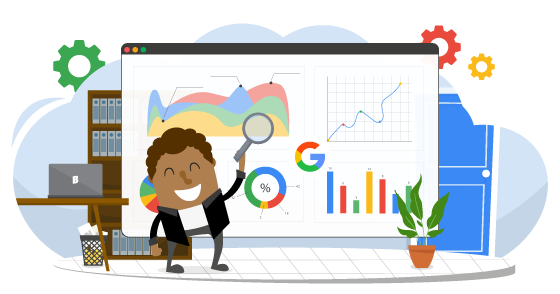Google Analytics 4: the must-take turn for your digital marketing
Jan 17 2023 / 3 min

Google Analytics 4 (GA4) is one of the latest additions to Google’s marketing suite. In March 2022, Google announced that this version would replace the current platform, Universal Analytics (UA). As of July 2023, UA stopped collecting data. Previously gathered data will be deleted at a later date, as determined by Google.
Why should you migrate to GA4 as soon as possible? To keep tracking your key metrics and website performance! Since this inevitable shift doesn’t happen overnight, it’s best to roll up your sleeves now.
Google Analytics 4 vs Universal Analytics: What’s the Difference?
GA4 fixes UA’s blind spots and pushes its data collection and analysis capabilities even further. It opens new doors through several innovations.
“The sooner you migrate to GA4, the faster you’ll build your data history, adapt your best practices, and train your teams—essential pillars of good monitoring!”
Here are some of the benefits you’ll enjoy.
1. Better Understand Your Audiences
GA4 introduces a new tool to configure and segment audiences. It’s more flexible and accurate, helping refine the definition of your target profiles.
By combining web and mobile analytics, the platform tracks the entire customer journey—acquisition, Engagement, monetization, and retention. This gives you deeper insight into your acquisition efforts and, for example, the impact of your marketing activities.
2. Leverage Automatic Event Tracking
You can automatically collect a range of web events tied to your business goals or digital campaigns, like downloading a white paper or watching customer testimonials on YouTube. By identifying these key moments, you gain visibility without the headache.
Examples of tracked events:
- Lead generation: filling out a signup form, interacting with a chatbot, or requesting a demo.
- Online sales: subscribing to a service or watching over half of a product video.
- Educational content: completing a tutorial or scrolling through a blog post to the end (or 90%).
3. Bring Engagement to the Forefront
Thanks to GA4’s new cross-platform tracking, you get a clearer picture of user engagement and can better assess the effectiveness of your campaigns across all devices and platforms.
You can examine user journeys in several ways, including:
- Path exploration: Visualize the sequence of visited pages and actions taken, while spotting friction points in the user experience (UX).
- Funnel exploration: Analyze the steps users take toward a specific action (or conversion) and pinpoint unwanted detours (or pain points).
4. Access Improved, Business-Friendly Reports
GA4’s interface, similar to UA, makes it easier to visualize and customize your data and reports. With new features and enhancements to existing categories (like real-time data), you’ll see your performance in a whole new light.
In addition to revamping its metrics and data schema, GA4 takes analysis to the next level. With machine learning, Google’s algorithms can build predictive audiences based on purchase or churn probability, revenue forecasting, etc. These audiences can then be targeted in Google Ads or social media campaigns.
5. Adapt to a Cookieless Digital World
First-party cookies are created by the website being visited and saved on the user’s hard drive for identification. Third-party cookies come from other sites that provide content on the visited page, like ads or images.
These cookies, central to many digital marketing tactics, are gradually disappearing due to stricter data privacy regulations. GA4 helps compensate for the data loss caused by the end of third-party cookies and minimizes its impact on your online performance tracking.
Google Analytics 4: Your New Digital Marketing Ally
The more you master your data, the better you can assess the impact and effectiveness of your marketing efforts—a key asset for maximizing your return on investment (ROI)!
To prepare or speed up your GA4 setup, reach out to our web team—they’ve been actively working on it for several months already!
You may also like

State of B2B Marketing in Quebec in 2026: What Our Exclusive Study Reveals
Executive Summary – Bang Marketing Study 2026 Territory studied: Quebec Sample: 211 B2B companies Period: September[...]
Strategy
Jan 12, 2026
/8 min

AI Is Making Us Ramble… Here’s How to Break the Habit
There’s a new plague in B2B marketing. It’s not AI stealing our jobs. It’s AI making us ramble. Sales pitches read [...]
Content marketing
Dec 15, 2025
/3 min

How to Prioritize Your B2B Marketing Projects in 2026 (and Achieve More with Less)
If your goal for 2026 is to better prioritize your B2B marketing projects with a small team that’s already stretche[...]
Strategy
Dec 1, 2025
/4 min
